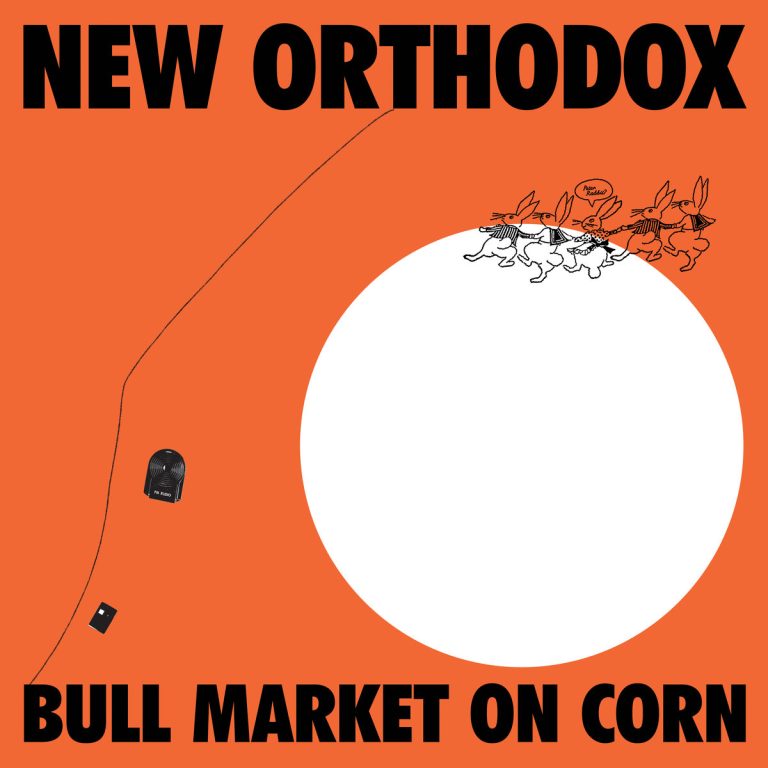How strange and funny it is to be reminded of something by the simplest thing. We see a shade of something familiar, hear an evocative note, have our smell memory activated, and suddenly we’re transported. Consider Scottie from the 1958 film Vertigo, who goes down an obsessive path because an echo of a woman he loved was brought to mind by a passing stranger on the street. Or – from another angle – how jazz musicians will teasingly quote each other during their solos. Ella Fitzgerald loved to playfully reference an abundance of her friends in her scatting; on a live version of “St. Louis Blues” with Chick Webb’s Orchestra she throws in a reference to Slim & Slam’s “Tutti Frutti”, Count Basie’s signature hit “One O’Clock Jump”, and tap dancer/movie star John W. Bubbles all in the space of about twenty seconds. A little hint is powerful stuff.
Cue New York’s Nicholas Merz. Already an established musician who has numerous albums under his own name, his new project New Orthodox continues his work, but condenses it down to a few elements while narrowing the focus of its themes. On his first album with this new moniker, Bull Market on Corn, the backgrounds are dingy and sparse with often little more than a skewed pedal steel guitar and some self-made percussion from tap shoes. It’s avant stuff in itself, but then Merz’s voice enters. A booming near baritone with an exhausted, almost absurdist voice that speaks in what feels like shards of conversation and poetry strung together. Reader, at its most vivid, it’s like you’re listening to a late Scott Walker album.
And how oddly comforting it is to hear this! It’s hardly an objective means of evaluating music, but there is definitely something to be said for enjoying music because it reminds us of other artists we love (especially singular artists who are no longer with us). Merz may not even be trying to emulate Walker, but the touchstones for the comparison are quite clear: commentary on the toxic traits of the United States; wordy and bookish humour playing with repeated phrases and how they change with each iteration; recording spaces deliberately captured so you can almost envision the setup (the album was recorded with Steve Albini, so that’s a given). If Bish Bosh or The Drift resonated in some way, Bull Market on Corn will sound like a distant cousin.
For those without this frame of reference, the album is still fascinating in spurts. On “Glory”, as Merz reckons with male perspectives of older generations, his desperate, boastful tone is oddly bewitching. “My father / I’m nothing like him / I’m different / I make friends / Work friends,” he pleads, like he’s shouting for mercy from the bottom of a well. All accompaniment bar an occasional foot stomp is gone on “Standing Ovation”, leaving Merz sounding like a man who has been left on his own too long. “Son of a bitch / That’s my mother you’re cursing / Take it back!” he argues with himself. A take on a man gone mad in the American capitalist system, or toxic masculinity simmering over the edge? Maybe both, but Merz recognises there’s a ridiculousness at play regardless, chewing the scenery with each line.
It’s when Merz is at his most scathing and direct that Bull Market on Corn excels. On opening track “Peacemakers Unite” he growls “Fuck ‘em” over reversed pedal steel tones and occasional tap dance rhythms. Just as he’s getting started he sounds well and truly done. “Blue Marble” features a guitar solo that sounds like a creaking metallic structure toppling, which feels apt for a song about the relationship between humans and the planet. A cover of Lou Reed’s “Waves of Fear” fits in perfectly here too, a summation of the destructive traits of the United States and also a boiling pot for Merz’s ire (and a song about drug withdrawal, which feels doubly suitable given America’s history with substance abuse). In what feels like a moment of sudden self-awareness, Merz snarls “I know where I must be, I must be in hell” with untethered frustration before the screeching distortion ends the track abruptly.
It doesn’t always captivate though. “Industrial Complex” might be labelled as ‘a noisily urgent response to America’s prison system’ but it’s just a transition as the reversed pedal guitar tones are re-reversed for the following track. The wearied “One Less Cop” paints with melancholic metallic hues as it captures Merz’s memories of living in a trailer as a child, but comes up short of evoking any sort of emotional response. Similarly “Berkeley Pit” offers an alarmed tone but says little, while the brief “Living Theatre” offers a slew of words that are mostly indiscernible. Final track “Lickety Split” sets an inquisitive, ambiguous tone over ticking guitar notes, but ends without any real poignancy or notable message, wrapping up like he’s waiting for someone else to make the next move. All of that equates to about half of the album’s runtime, which doesn’t bode well on paper, but those stronger moments do do a good amount of heavy lifting to make the album worth a trip.
Is it enough then to recommend checking out an album based on what it reminds this reviewer of? For those who like their music avant garde, enjoy sprechgesang with sardonic sighs, are fond of sparse backdrops imbued with some history (of both America and the pedal steel, as Merz morphs and mangles the instrument to sound miles beyond its traditional roots), or just want to hear a guy yowl like Scott Walker, then there’s no harm in spinning Bull Market on Corn even in passing. It might serve as little more than a stepping stone before revisiting the work of what it evokes, but sometimes just the reminder is enough. A strange and funny moment of recall is enough to open up a whole world in itself.

